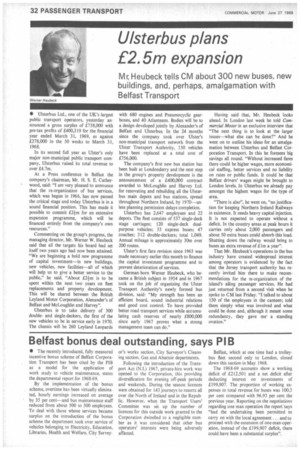Ulsterbus plans £2.5m expansion
Page 34

If you've noticed an error in this article please click here to report it so we can fix it.
Mr. Heubeck tells CM about 300 new buses, new buildings, and, perhaps, amalgamation with Belfast Transport
• Ulsterbus Ltd., one of the UK's largest public transport operators, yesterday announced a gross surplus of £738,000 with pre-tax profits of £400,319 for the financial year ended March 31, 1969, as against £278,000 in the 50 weeks to March 31, 1968.
In its second full year as Ulster's only major non-municipal public transport company. Ulsterbus raised its total revenue to over £4.7m.
At a Press conference in Belfast the company's chairman, Mr. H. S. E. Catherwood, said: "I am very pleased to announce that the re-organization of bus services, which was begun in 1966. has now passed the critical stage and today Ulsterbus is in a sound financial position. This has made it possible to commit £24-m for an extensive expansion programme, which will be financed entirely from the company's own resources."
Commenting on the group's progress, the managing director, Mr. Werner W. Heubeck said that all the targets his board had set itself two years ago had now been attained. "We are beginning a bold new programme of capital investment—in new buildings, new vehicles, new facilities—all of which will help us to give a better service to the public," he said. "About £2-1-m is to be spent within the next two years on fleet replacements and property development. This will be shared between the British Leyland Motor Corporation, Alexander's of Belfast an& McLoughlin and Harvey".
Ulsterbus is to take delivery of 300 doubleand single-deckers, the first of the new vehicles to be in service early in 1970. The chassis will be 260 Leyland Leopards with 680 engines and Pneumocyclic gearboxes, and 40 Atlanteans. Bodies will be to a design developed jointly by Alexander's of Belfast and Ulsterbus. In the 24 months since the company took over Ulster's non-municipal transport network from the Ulster Transport Authority, 150 vehicles have been replaced at a total cost of £756,000.
The company's first new bus station has been built at Londonderry and the next step in the group's property development is the announcement of a £400,000 contract awarded to McLoughlin and Harvey Ltd. for renovating and rebuilding all the Ulsterbus main depots and bus stations, spread throughout Northern Ireland, by 1970—unless planning permission delays completion.
Ulsterbus has 2,647 employees and 22 depots. The fleet consists of 537 single-deck stage carriages; 120 single-deck dualpurpose vehicles; 33 express buses; 47 coaches; 312 double-deckers; total 1,049. Annual mileage is approximately 30m over 200 routes.
Ulster's first fare revision since 1963 was made necessary earlier this month to finance the capital investment programme and to prevent deterioration of services.
German-born Werner Heubeck, who became a British subject in 1954 and in 1967 took on the job of organizing the Ulster Transport Authority's newly formed bus division, said: "My strength has been an efficient board, sound industrial relations and good cost control. To have provided better road transport services while accumulating cash reserves of nearly £800,000 since early 1967 proves what a strong management team can do."
Having said that, Mr. Heubeck looks ahead. In London last week he told Commercial Motor in an exclusive interview that "The next thing is to look at the larger issues—what else can be done?" And he went on to outline his ideas for an amalgamation between Ulsterbus and Belfast Corporation Transport. In this he foresees big savings all round. "Without increased fares there could be higher wages, more economical staffing, better services and no liability on rates or public funds. It could be that Belfast drivers' wages might be brought to London levels. In Ulsterbus we already pay amongst the highest wages for the type of area.
"There is also", he went on, "no justification for keeping Northern Ireland Railways in existence. It needs heavy capital injection. It is not expected to operate without a deficit. In the country areas at peak hours it carries only about 2,000 passengers and about 50 extra buses could absorb this load. Shutting down the railway would bring to buses an extra revenue °Ulm a year".
That Mr. Heubeck's operations in the bus industry have created widespread interest among operators is evidenced by the fact that the Jersey transport authority has recently invited him there to make recommendations for the re-organization of the island's ailing passenger services. He had just returned from a second visit when he spoke to CM last Friday. "I talked to about 150 of the employees in the canteen; told them simply what was involved and what could be done and, although it meant some redundancy, they gave me' a standing ovation."


















































































































